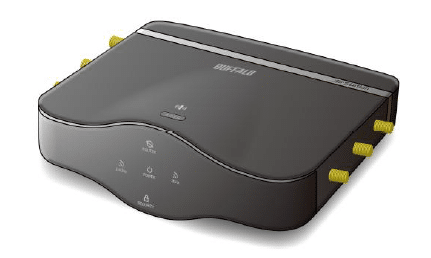CES isn’t just about telling you what to buy, it’s also about telling you what you’re going to be buying. You know hat 802.11n router you just got for Christmas? You probably don’t want to say this too loud around it, but Buffalo Technologies wants it to be obsolete by this time next year. The company is showing a preliminary version of its upcoming AirStation WZR-1750H wireless router using the not-yet-final 802.11ac wireless networking standard.

Not expected to be finalized until the latter half of this year, this version of the venerable 802.11 standard uses the less-crowded 5GHz radio band and promises a theoretical maximum throughput of more than 1Gbps. Buffalo claims its implementation in the WZR-1750H reaches 1.3Gbps. They’ve also included a 2.4GHz radio capable of 450Mbps to maintain compatibility with older 802.11 versions. Since the radios operate independently, the device is theoretically capable of 1.75Gbps total throughput.
Results in the real world are likely to be less but, let’s face it, it’s probably better than what you have now. Besides wireless connectivity, the WZR-1750H features five gigabit Ethernet ports All that speed does no good if you don’t have a wireless adapter that speaks 802.11ac. Buffalo is addressing that with the WLI-TX4-1300H wireless bridge. Featuring four gigabit Ethernet ports, the bridge can connect any device that requires a standard Ethernet connection to the Internet via 802.11ac. Both the router and bridge are expected to be released in the second half of 2012.
One of the use cases Buffalo touts for 802.11ac is its potential for use in NAS devices like, say, Buffalo’s own Cloudstor product. Alas, no announcements like that are coming this week. The only Cloudstor news is that the device is no longer limited to North America. It’s now being shipped worldwide, though in Europe and Asia it’s called CloudStation.




 Amazon
Amazon